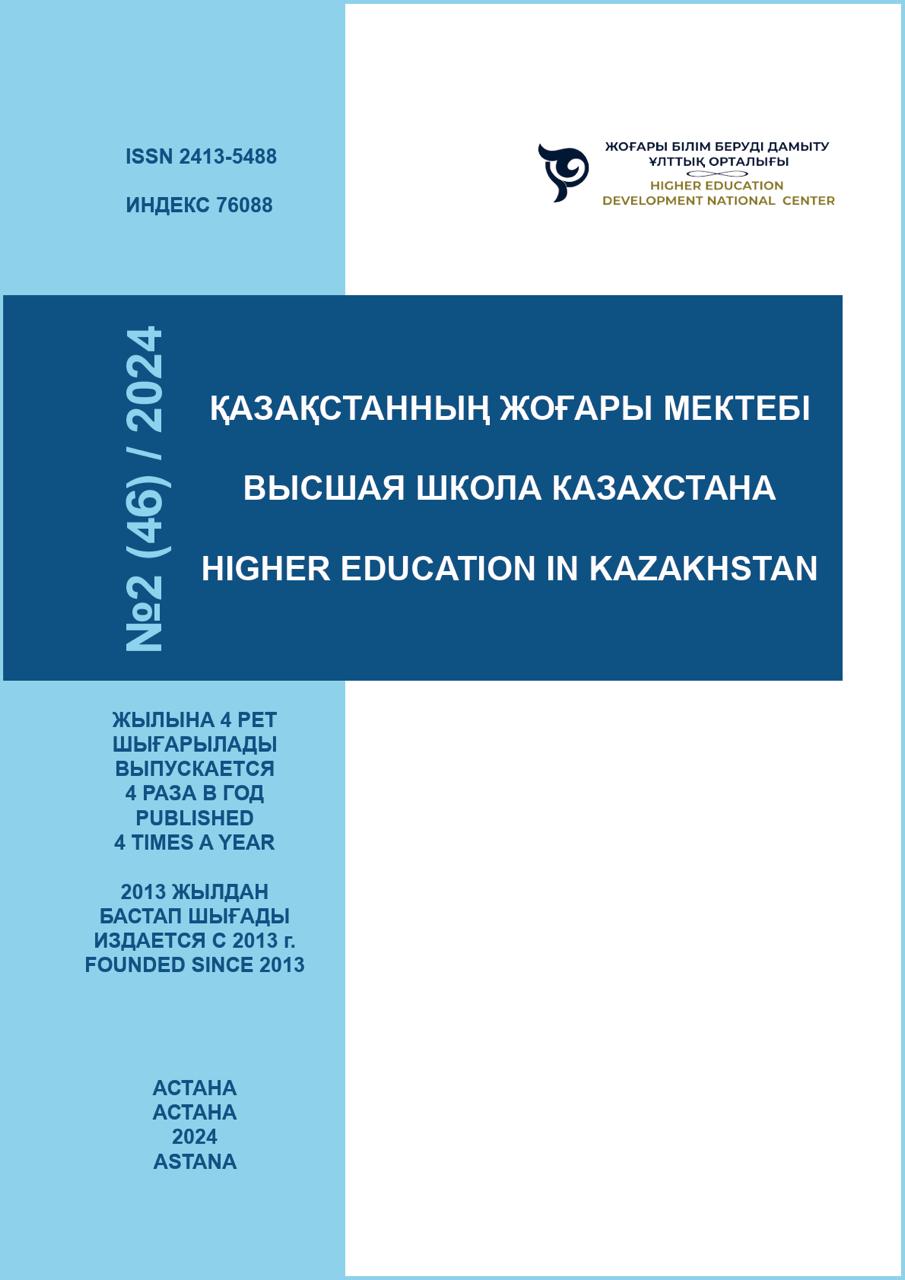AN INVESTIGATION INTO CURRENT CONDITION OF THE FORMATION OF FOREIGN LANGUAGE PROFESSIONAL-COMMUNICATIVE COMPETENCIES IN ONLINE EDUCATIONAL FORMAT (in the sample of non-linguistic universities)
DOI:
https://doi.org/10.59787/2413-5488-2024-46-2-14-24Keywords:
online education, higher education, non-linguistic university, foreign language professional-communicative competencies, digitalization, massive open online coursesAbstract
This article is written to determine the peculiarities of formation of foreign language professional-communicative competencies of the non-linguistic university students in online education. The authors scrutinize the key aspects of professional-communicative competencies in foreign language based on the earliest investigations provided by foreign and Kazakhstani scholars and on the results of the questionnaire. Moreover, the authors emphasized the significance of online education in the formation of professional-communicative competencies in foreign languages on the basis of the monitor and report, made by National Center for Higher Education Development. However, authors claim that the challenges persist in some Kazakhstani universities, including non-linguistic ones. Despite the universities have utilized the platform to offer massive open online courses, they still face issues related to methodological and technological aspects of online education implementation. Thus, the authors demonstrate the overview on the procedure of integration of online lessons, especially, for the development of foreign language professsional-communicative competencies in agrarian universities. In this regard, the research was carried out among 200 students and teaching staff of the S. Seifullin Kazakh Agrotechnical Research University to identify the current condition of foreign langauge professional-communicative competencies formation in online education.
References
Abdurazakova, E. P. (2010). Foreign language communicative competence as one of the components of personal and professional characteristics of a modern professional. Vektor nauki TGU, 3(13).
Ahmad Kamil, M., & Muhammad, A. M. (2021). Professional communication competence in English for occupational purposes (EOP) courses: A systematic literature review and proposal of a framework. Journal of Teaching and Learning for Graduate Employability, 12(2), 260-278. https://doi.org/10.21153/jtlge2021vol12no2art1075
Ahmmed, R., Sinha, B. S., Khan, R., & Islam, D. M. (2020). A needs analysis of maritime English language skills for Bangladeshi seafarers to work on-board ships. Marine Policy, 119, 104041. https://doi.org/10.1016/j.marpol.2020.104041
Al Mamun, M. A., Lawrie, G., & Wright, T. (2020). Instructional design of scaffolded online learning modules for self-directed and inquiry-based learning environments. Computers & Education, 144, 103695. https://doi.org/10.1016/j.compedu.2019.103695
Belwal, R., Priyadarshi, P., & Al Fazari, M. H. (2017). Graduate attributes and employability skills. International Journal of Educational Management, 31(6), 814-827. https://doi.org/10.1108/ijem-05-2016-0122
Canale, M. (1980). Theoretical bases of communicative approaches to second language teaching and testing. Applied Linguistics, 1(1), 1-47. https://doi.org/10.1093/applin/1.1.1
Chaklikova, A.T. (2012). Sostoianie i tendentsii informatizatsii inoiazychnoho obrazovaniia [State and trends of informatization of education in foreign languages]. Proceedings from Teacher IYA in the context of informatization of foreign-language education: Respublikanskaia nauchnaia-prakticheskaiai konferentsiia – Republican scientific-practical conference. (pp. 6–10). Almaty [in Russian]
Greene, J. O. (2016). Communication skill and competence. Oxford Research Encyclopedia of Communication. https://doi.org/10.1093/acrefore/9780190228613.013.158
Hymes, D. H., Pride, J. B., & Holmes, J. (1972). On communicative competence.
Kudryashova O.V. (2007). Bull. of South Ural State University, 15, 87 p
Mikhailova, T., Duisekova, K., Orazakynkyzy, F., Beysembaeva, G. Z., and Issabekova, S. (2021). The evaluation of intercultural professional technology-based communicative competence formation for students. World Journal on Educational Technology, 13(2). 272–287. Retrived from https://doi.org/10.18844/wjet.v13i2.5700
National Center for Higher Education Development (2023) Monitoring the implementation of distance learning in higher education institutions of Kazakhstan in 2023. Аstana, pp. 4. Retrived from https://enic-kazakhstan.edu.kz/uploads/additional_files_items/205/file/1-5-realizaciya-distancionnogo-obrazovaniya.pdf?cache=1704971411 [in Russian]
Naurzalina, D. (2015). Formation of teacher’s professional competence in Kazakhstan school. European Proceedings of Social and Behavioural Sciences. https://doi.org/10.15405/epsbs.2015.08.13
President hold talks with Qu Dongyu, Director General of the UN Food and Agriculture Organisation (FAO) — Official website of the President of the Republic of Kazakhstan. (n.d.). Akorda.kz. Retrived from https://www.akorda.kz/en/123-1905859
S. Seifullin Kazakh Agrotechnical research University (2019) Report on self-assessment of Bachelor's, Master's and doctoral degree programs within the framework of specialized NAAR accreditation. Astana, pp. 21. Retrived from https://kazatu.edu.kz/files/docs/8b85c403b17232228ba9dd19db74867f.pdf [in Russian]
Valeeva, R.A., Baykova, O.V. & Kusainov, A.K. (2016). Foreign Language Professional Communicative Competence as a Component of the Academic Science Teacher’s Professional Competence. International Journal of Environmental and Science Education, 11(3), 173-183. . https://doi.org/10.12973/ijese.2016.301a

Downloads
Published
Issue
Section
License
Copyright (c) 2024 Scientific and analytical journal "Higher school of Kazakhstan"

This work is licensed under a Creative Commons Attribution-ShareAlike 3.0 Unported License.





